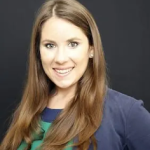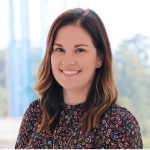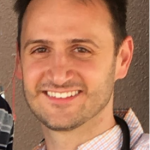Welcome to the UNC Eshelman School of Pharmacy Newsletter for Experiential Partners and Preceptors! Newsletters will share updates about the School and Experiential Programs, recognize our preceptors and students, and provide teaching pearls for preceptors.
Updates From the Office of Experiential Programs
RxPreceptor (CORE Elms) Account Updates Requested
As we begin the new academic year, please take a moment to update your RxPreceptor (CORE Elms) account! Contact us at immersion@unc.edu with any questions.
Go to: https://www.corehighered.com/login-elms and login with your username and password
- Add a photo – Click the camera icon next to your name at the top of the home page to upload a photo. Students will then be able to “see” you on their schedule
- Confirm/Update Contact Information – Go to “My Account” at the top of the home page to update contact information.
- Update Site/Experience Description – Select profile information on the left-hand side menu and then “description”. Consider including:
- Brief overview of your site/experience
- What makes your site/experience unique
- Special Projects/description of patient population
- Description of a typical day
- Add Documents (Optional) – Add or update documents associated with your experience by selecting profile information on the left-hand side menu and then “documents.” Consider including:
- Site policies
- Project descriptions and details
- Recommended readings
- Please do not upload a syllabus. All School syllabi are located in the document library in Rx Preceptor
Welcome Jacqueline Dunn and Sarah Squatriglia
The School is excited to welcome two new individuals to the Office of Experiential Programs who bring valuable experience to our team: Jacqueline Dunn and Sarah Squatriglia. Please read further to learn more about these new team members.
Jacqueline Dunn is serving as the Program Manager with the Office of Experiential Programs and Interprofessional Affairs. In her role as Program Manager, Jacqueline will support the Office of Experiential Programs and Interprofessional Affairs with their various programmatic efforts, primarily in Career Services and with NC AHEC. She will also help manage RASP, the School’s research and scholarship pathway, and provide administrative support to the Associate Dean of Experiential Programs and Interprofessional Affairs.
Jacqueline is originally from Charlotte, NC and graduated from UNC-Chapel Hill with her bachelor’s in Communication Studies and Anthropology. In 2021, she graduated with her master’s degree in Higher Education Administration from Appalachian State University. For the past five years, Jacqueline worked as an Executive Assistant in the Office of the Vice Chancellor for Students Affairs at UNC where she quickly learned that she loves working on a university campus, serving students and the campus community in support of the University’s mission. Jacqueline shared: “I am excited to wear this role’s many hats and work with students, staff members, faculty, external partners, and other constituents across the UNC Eshelman School of Pharmacy.”
In her role as Director of Experiential Student and Career Services, Sarah will support students on both the Chapel Hill and Asheville campuses throughout their experiential curriculum in the PharmD program. Sarah will work to further the strategic goals of the Eshelman School of Pharmacy, particularly in the areas of career development, student support, and well-being. Sarah is most looking forward to working with the exceptional students in the Eshelman School of Pharmacy and helping the next generation of pharmacists have a lasting impact on the State of North Carolina and the world.
Originally from Connecticut, Sarah graduated from the University of Connecticut with her bachelor’s in history. Sarah has two master’s degrees from the University of Bridgeport: one in Education, and another in Counseling, with a concentration in College Student Personnel. She has worked in higher education for over ten years, most recently at Wake Forest University and Hunter College in New York City, in the areas of academic advising and support services. Sarah and her husband recently relocated to the Triangle and are excited to explore everything North Carolina has to offer!
Student Spotlight
 Neel Swamy, MPH, Class of 2023
Neel Swamy, MPH, Class of 2023
Congratulations to Neel Swamy, Class of 2023, for being selected to participate in the Center for Disease Control and Prevention’s (CDC) Pharmacy Student Experiential Program.
Neel is a fourth-year Doctor of Pharmacy candidate at the UNC Eshelman School of Pharmacy. Witnessing a close friend’s battle with mental illness and substance use disorder led to his pursuit of pharmacy as a career. His interest in mental health and passion for community-wellbeing after completing a summer internship with a public health nonprofit organization in India motivated him to pursue a Master of Public Health dual degree program with UNC Gillings School of Global Public Health. His master’s thesis evaluated potential federal policy solutions to address the United States opioid epidemic.
Neel will be completing his advanced pharmacy practice experience with the CDC’s Division of Birth Defects and Infant Disorders in March 2020. He is the first UNC student selected for the program since 2014. Neel noted that he is “very grateful to the faculty mentors and preceptors who supported me prior to and throughout the application process.”
While he hopes to pursue additional clinical training and work closely with patients impacted by mental health after graduation, his long-term career goal is to work in a governmental health agency such as a state health department. Neel shared that an “experience with the Centers for Disease Control and Prevention would challenge me in a unique way by exposing me to the role that pharmacists play in governmental public health.”
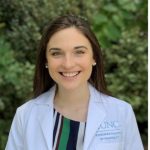 Caroline Herron, Class of 2022
Caroline Herron, Class of 2022
Congratulations to Caroline Herron, Class of 2022, for being selected for the Jamie Gasaway Kilar Patient Care Award. This award honors a student “who has exhibited the highest standards of knowledge, dedication, and compassion in patient care at UNC Eshelman School of Pharmacy.” This award is provided by the UNC Eshelman School of Pharmacy Foundation and made possible through the generosity of Jamie Gasaway Kilar, BSPharm ’95, PharmD ’97.
Caroline is originally from Asheboro, North Carolina and completed her undergraduate and pharmacy studies at the University of North Carolina at Chapel Hill. Throughout pharmacy school, Caroline enjoyed leading the Student Opioid Misuse Prevention Task Force on a number of community service and harm reduction initiatives. Highlights of her pharmacy school experience included the memorable patient care opportunities and mentorship she received from professional role models in her preceptors. Patient care and extracurricular experiences in pharmacy school have fueled her passion to break stigma around substance use disorders, empower patients to advocate for their health, and serve under-resourced populations.
As a military spouse, Caroline is excited to start her journey as a pharmacist serving veterans as a PGY-1 pharmacy resident at the Syracuse Veterans Affairs Medical Center in Syracuse, New York.
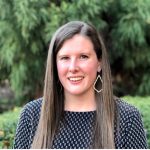 Meghan Peterson, Class of 2022
Meghan Peterson, Class of 2022
Congratulations to Meghan Peterson, Class of 2022, for being selected as a recipient of the John C. Hood, Sr. Award in Practice Advancement and Clinical Education. This award recognizes a graduating student “who excels in clinical-therapy courses and demonstrates the highest level of professionalism and exemplary patient care during pharmacy immersion experiences.” This award is provided by the UNC Eshelman School of Pharmacy Foundation and is given by family and friends of John C. Hood, Sr., a charter member of the North Carolina Pharmaceutical Association.
Meghan received her Bachelor of Science in Biochemistry and minor in Spanish Language and Culture from Elon University and her Doctor of Pharmacy from UNC Eshelman School of Pharmacy. Her honors research project focused on Emergency Drug Cart Stocking Practices in North Carolina Hospitals. During her fourth-year pharmacy practice experiences, she completed a medication use evaluation examining indomethacin use for intraventricular hemorrhage prophylaxis in the neonatal intensive care unit. She was a pediatric pharmacy intern at Duke University Medical Center and a community pharmacy intern at Southern Village Pharmacy. She was an active member of ASHP-SSHP, APhA-ASP, and SHAC, a student-led interdisciplinary free clinic, and the recipient of numerous scholarships and awards.
Meghan will complete a PGY-1 pharmacy residency at Vanderbilt University Medical Center, and, at the time of this publication, desired to complete a PGY-2 residency focused in pediatrics or critical care. Meghan’s long-term goals include becoming a board-certified clinical pharmacist in an Academic Medical Center, providing high-quality care to a diverse patient population while teaching and engaging in research.
Please click here to see all the deserving recipients of awards during the 2022 UNC Eshelman School of Pharmacy Awards Ceremony.
Preceptor Spotlights
Preceptor of the Year Awards
Congratulations to three exceptional preceptors who were recipients of the 2022 Claude Paoloni Preceptor of the Year Award during the 2022 UNC Eshelman School of Pharmacy Awards Ceremony on April 23, 2022: Dr. Jessica Auten, Dr. Anna Baird, and Dr. Chris Evans. The recipients of the Claude Paoloni Preceptor of the Year awards are nominated by graduating students to recognize preceptors for outstanding contributions to the educational development of future pharmacists. These individuals have demonstrated high standards of professionalism, ethics and clinical practice. These awards are given by the Paoloni family in memory of Claude Paoloni and in recognition of his many years of service to the UNC Eshelman School of Pharmacy. Claude Paoloni was instrumental in the evolution of the clinical pharmacy program and the growth and development of the AHEC system for statewide pharmacy.
Dr. Jessica Auten received her Pharm.D. degree from the UNC Eshelman School of Pharmacy in 2012. Since then, she has completed a PGY1 pharmacy practice residency and a PGY2 oncology pharmacy residency at the Virginia Commonwealth University Health System in Richmond, VA. Presently, Dr. Auten works as an inpatient oncology pharmacy specialist in malignant hematology at UNC Medical Center. She also serves as the Residency Program Director for the PGY2 oncology pharmacy residency program and the PGY2 pediatric-focused oncology pharmacy residency program at UNC Medical Center. Dr. Auten’s practice and research interests focus on acute leukemia, supportive care, and patient education.
Excerpts from student nominations include: “Jessica was the best preceptor I have had so far in my pharmacy career. I could tell that she was incredibly busy, but still went out of her way to teach me topics I had little familiarity with. Additionally, she was patient with me on rounds even when I asked questions that were more appropriate for post-round debriefs. My rotation was set up similarly to a course at UNC. I had scheduled reading assignments with learning objectives along with accompanying lectures to answer my questions. I have not experienced this level of organization on a rotation yet. Jessica constantly displayed a serious commitment to helping her students while carrying out all of her other responsibilities. …I believe Jessica would be an excellent recipient of preceptor of the year.”
Dr. Anna Baird graduated from the UNC Eshelman School of Pharmacy in 2018 and completed a PGY1 Community-based Pharmacy Residency with UNC Eshelman School of Pharmacy and Realo Drugs. Dr. Baird currently serves as a clinical pharmacist at Realo where she provides chronic care management services for a local Accountable Care Organization and works with providers to improve quality metrics. She is the program coordinator and a certified lifestyle coach for the National Diabetes Prevention Program and an educator for Realo’s Diabetes Self-Management Education and Support program. Baird is passionate about enhancing the role of community pharmacy and strives to involve her students in numerous opportunities to advance community pharmacy practice both on and off the counter.
Some nominating comments include: “Dr. Baird is a professional in her field of community pharmacy that sheds light on what patient care should look like. Her professionalism and expertise were evident through her relationships with both providers and patients. Dr. Baird gave me opportunities to grow and push my knowledge throughout my experience. Upon arriving at Realo on the first day of immersion, [Dr. Baird] immediately wanted to hear and understand my goals. [She] continually encouraged me to seek additional knowledge about my interests, as well as take the lead on various projects. Dr. Baird was truly the best preceptor I have worked with in rotations or while working in community pharmacy. The lessons that I learned throughout those…weeks were invaluable, and I feel very fortunate to have been part of the Realo Family.”
Dr. Chris Evans received his Doctor of Nursing Practice from East Carolina University and is certified as an Advanced HIV/AIDS Certified Registered Nurse. He serves as an adult nurse practitioner with the UNC Division of Infectious Disease and has coordinated numerous national and international trials related to HIV, influenza, and Ebola. His clinical practice is with Wake County Human Services, where the team serves a population of over 1400 individuals living with HIV and 300 individuals receiving pre-exposure prophylaxis (PrEP) and post-exposure prophylaxis (PEP) care. His research interests include rapid initiation of ART and access to care. He enjoys serving internationally and volunteering with partners in West Africa to improve access to quality care in the region.
Portions of nominating comments include: “Chris Evans exemplified the ideal preceptor. It was clear that his students were a priority, as he was always available for questions, and encouraged me to step in and have a hands-on role during the appointments…He also took the time to answer my questions …important to understanding different roles in an interprofessional team. This was also by far the most uplifting rotations I have experienced throughout pharmacy school. I remember being a part of one appointment in particular where we were telling a patient they had HIV for the first time. Understandably, the patient was very emotional at hearing this news, but Chris was able to comfort and calm the patient while providing a positive outlook. Chris’s positive attitude carried over to how he treated all the practitioners in the clinic, creating a sense of comradery and close-knit community in the clinic. ….Chris has created the optional…rotation for growth as a pharmacy student while working with a rewarding patient population.”
Preceptor Recognition
Practice Advancement and Clinical Education Adjunct Faculty Promotions
Congratulations to the following individuals who were recently promoted to Associate Professor of Clinical Education at UNC Eshelman School of Pharmacy for sustained involvement in teaching, scholarship, and service to the School and profession. The School is grateful for their contributions.
Associate Professor of Clinical Education
 Brian Murray, PharmD, BCPS, BCCCP- UNC Medical Center
Brian Murray, PharmD, BCPS, BCCCP- UNC Medical Center
Dr. Brian Murray received his PharmD from the UNC Eshelman School of Pharmacy in 2010. After pharmacy school, he completed two years of post-graduate residency training at the University of North Carolina Medical Center, specializing in critical care. He is currently a clinical pharmacy specialist in the adult medical ICU at the University of North Carolina Medical Center. For the last 5 years, he has served as program director for the critical care pharmacy residency training program.
When asked about how students are incorporated into practice experiences, Dr. Murray shared the following: “I’m a believer that students of all ability levels and interests are capable of contributing meaningfully to patient care, even in a niche environment like the ICU, with provision of appropriate foundation and guidance. Students are given a foundation in ICU supportive care, aspects that are fundamentally common to most if not all ICU patients. They are assigned a small number of complex and acute ICU patients without a dense hospital history to navigate and encouraged to favor depth over quantity in their patient work-up. Students are encouraged to stay engaged during rounds and discussions for all patients to build out their ICU vocabulary and bring key principles into focus. Building a foundation of supportive care principles and focusing in depth on one or two disease states at a time while filling in general gaps allows learners to develop confidence quickly, which can be turned into action on rounds or at the bedside. Students are encouraged to attempt an independent assessment of all data collected and independent plan building based on that assessment, and with daily critique those skills become more refined. The overall goal is to have students of any level performing all of the roles of a clinical pharmacist, on a smaller scale and with a safety net.”
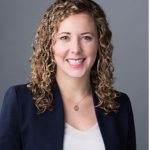 Mary-Haston Vest, PharmD, MS, BCPS- UNC Medical Center
Mary-Haston Vest, PharmD, MS, BCPS- UNC Medical Center
Dr. Mary-Haston Vest is an Assistant Director of Pharmacy with UNC Health and an Associate Professor of Clinical Education at the UNC Eshelman School of Pharmacy. She oversees Pharmacy Analytics and Outcomes Services and leads the development of organizational approaches to integrate data analytics to effectively measure and positively impact patient outcomes. She also is leading the development of a system Outcomes Research Program, established to improve patient care through high quality research while demonstrating the value of UNC pharmacy services and furthering innovation within the profession of pharmacy. She has been on the teams recognized with two ASHP Best Practices Award. She earned her Doctor of Pharmacy at the University of Mississippi School of Pharmacy and PGY1/PGY2/MS in Health-System Pharmacy Administration at UNC Medical Center and the UNC Eshelman School of Pharmacy. Dr. Vest is actively involved in state and national professional organizations, currently serving as Chair of the ASHP Section of Pharmacy Practice Leaders Advisory Group on Quality, Value and Compliance, and Chair of the North Carolina Association of Pharmacists (NCAP) Health-System Practice Academy.
Dr. Vest serves as a preceptor for UNC Eshelman School of Pharmacy and UNC Medical Center, and precepts both student and resident learners within her practice site. Additionally, she has mentored students and residents on longitudinal research experiences. Her rotation is aimed to expose learners to broad leadership concepts, management skills, and an overview of health-system administration and leadership, planning, and strategy. She is also passionate about exhibiting the role of analytics and informatics within pharmacy practice. Mary-Haston shared the following about her precepting philosophy: “I believe that the teacher-student relationship is a mutual one, in which both parties can expect to be respected and heard. I also believe that students can expect preceptors to be approachable, invested in their success, and an advocate for their needs both as students and future pharmacy professionals.”
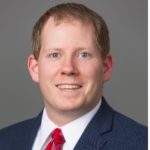 Tyler Vest, PharmD, MS, BCSCP- Duke University Hospital
Tyler Vest, PharmD, MS, BCSCP- Duke University Hospital
Dr. Tyler Vest is the Associate Chief Pharmacy Officer of Inpatient Pharmacy Services at Duke University Hospital in Durham, North Carolina. In this position, he oversees the automation, sterile compounding, non-sterile compounding, unit dose dispensing, carousels, automated dispensing cabinets, medication delivery and distribution, and controlled substances for the department of pharmacy. He also serves as the Coordinator for the Health-System Pharmacy Administration and Leadership Residency Program at Duke University Hospital. Tyler completed his Pre-Pharmacy Studies at the University of Kentucky and his Doctor of Pharmacy at the University of Cincinnati James L. Winkle College of Pharmacy. He completed his Master of Science Degree in Pharmaceutical Sciences with a Specialization in Health-System Pharmacy Administration at the UNC Eshelman School of Pharmacy. Dr. Vest completed his PGY1 Pharmacy Practice Residency and PGY2 Health-System Pharmacy Administration Residency Programs at the University of North Carolina Medical Center. His current interest areas are acute care operations, leadership development, oncology, practice and pharmacy technician advancement, pharmacy practice and distribution models, productivity and monitoring, and the medication use process. Dr. Vest is actively involved in the profession. On the state level, he is actively involved in the North Carolina Association of Pharmacists (NCAP). On a national level, Dr. Vest is involved in several roles in ASHP, ACCP, and is a member of the Vizient University Health-System Consortium Pharmacy Network Practice Advancement Committee (PPAC).
Dr. Vest describes his teaching practices as follows, “Learning occurs by providing the learner the subject matter in the proper environment. This can vary depending on the scope and nature of the content being discussed. I believe that when we teach in the profession of pharmacy, we should include the pertinent literature to the content being taught. The content should be coupled with active discussion to help the learner understand the current scope of the topic, and gaps that are present. The learner understanding of these concepts will help them engage in the direction of topic at hand. I believe an active discussion partnered with the current literature allows learners to grasp the concepts and topics.” Tyler incorporates learners into various aspects of acute care operations. He precepts PY4 students and residents at his site. Tyler also has mentored several thesis substitutes for students and residents enrolled in the Master of Science Degree in Pharmaceutical Sciences with a Specialization in Health-System Pharmacy Administration at the UNC Eshelman School of Pharmacy.
Practice Advancement and Clinical Education Adjunct Faculty Appointments
Congratulations to the following preceptors who recently received or renewed their Clinical Education Adjunct Faculty appointments. We thank them for their commitment to teaching, scholarship, and service for the School and profession. More information about this biannual process can be found here.
Assistant Professor of Clinical Education
- Anna Abrahamson, PharmD, CPP, BCACP – UNC Medical Center Specialty and Primary Care Clinics
- Caitlin Akerman, PharmD, BCPS -WakeMed Health and Hospitals
- Olivia Caron, PharmD, BCACP, CPP -Mountain Area Health Education Center (MAHEC)
- Ina Liu, PharmD, MS, BCPS- UNC Healthcare- WakeBrook Campus
- Diana Nowicki, PharmD, BCPS, BCACP – AAHIVP UNC Health Investigational Drug Services
Associate Professor of Clinical Education
- Michael Wolcott, PharmD, PhD, BCPS, BCIDPS- High Point University School of Dental Medicine and Oral Health
Preceptor Pearl
Scott Wilkie, PharmD, BCPS
Assistant Professor of Clinical Education
Clinical Pharmacist Faculty in Internal Medicine
Mission Health
Want Students to Remember What They Learn? Have Them Teach It!
I was once told, “If you are not having fun teaching, you are not teaching right”. Perhaps some of my colleagues would debate this statement. However, being a pharmacist means we are teachers, and it is the expectation that, as pharmacists, we teach others (i.e. patients, nurses, physicians, other pharmacists, and obviously our learners – students and residents). Specifically, for our learners, we as preceptors, incorporate a variety of methods to train our learners. Topic discussions is one method that is fun, challenges the learner and can greatly impact their clinical growth. Evidence demonstrates benefit for learners who lead topic discussions and interestingly, even more so if done without notes. The benefits from this strategy are not limited to comprehension, but improved social-emotional learning skills, confidence, and communication skills.
Learning by teaching, Protégé Effect, or peer tutoring, is when learners explain something to someone else and in the process will learn. This is not a new concept, as historical figures have observed the benefits of teaching: “While we teach, we learn” (Seneca, 4BC – 65AD); “He who teaches others, teaches himself” (John Amos Comenius 1592 – 1670); and “To teach is to learn twice” (Joseph Joubert 1754 – 1824). Is there any evidence to support this approach in modern times?
Dr. Richard Mayer is an educational psychologist and Professor of Psychology at the University of California, Santa Barbara. One area of his research focuses on theories of cognition and learning. He states that learning-by-teaching is a strategy that more instructors should utilize and has one of the greatest effects on learning. One of his studies compared students who used the learning-by-teaching strategy with those who did not. His group found that when students actually teach the content of a lesson, they develop a deeper and longer-lasting understanding of the material than students who did not teach it. They found that the act of preparing to teach alone can lead to short-term gains, but the act of preparing to teach combined with actually teaching another person is what leads to long-term retention and deeper understanding. Dr. Mayer believes that when students are told they are going to have to teach, students prepare differently. When students actually teach, “questions asked by their colleagues help them build knowledge by elaborating on the material, monitoring their own understanding and fixing misunderstandings – all of which help students construct deeper meaning and long-term understanding.”
What is an underlying mechanism on the benefits of learning-by-teaching? Dr. Stephen Wee Hun Lim, at the National University of Singapore, suggests that the benefit may lie in the retrieval process. He found that learners who could not use notes while presenting had longer lasting understanding of the topic than the group who could use notes during a presentation. The research team’s results suggest that “the benefits of the learning-by-teaching strategy are attributable to retrieval practice; that is, the robust learning-by-teaching strategy works but only when the teaching involves retrieving the taught materials.”
For the past 5 years, I implemented this learning-by-teaching strategy on my service. Over the course of my rotation, PY4 learners present 2 to 3 one-hour topics without notes. However, I don’t limit this experience to just my PY4 learners. My PY2 and PY3 students also go through the same process, but they only lead 1 topic per 4 weeks. Some observations and points I have learned along the way.
- Learners are typically most worried about presenting topics without notes.
- Create an environment where active engagement is emphasized and making mistakes is not punitive.
- The learner generally researches the topic and submits three documents: a guideline, review article and primary literature article.
- Encourage active engagement from other learners on thorough questioning.
- If possible, utilize a dry erase board.
- Preceptors should interject with their own clinical experience/knowledge
- All students improve from the 1st topic to the 2nd
- At the end of the rotation, student feedback is positive – “it was stressful, but I am glad I did it.”
- Encourage learners to lead topic discussions on subsequent rotations.
References
Aloysius Wei Kun Joh (2018). The learning benefits of teaching: A retrieval practice hypothesis. Applied Cognitive Psychology; 32:401-410.
Duran, David (2016). Learning-by-teaching. Evidence and implications as a pedagogical mechanism. Innovations in education and teaching international; 1-9.
Fiorella, Logan (2014). Role of expectations and explanations in learning by teaching. Contemporary Education Psychology. 39(2):75-85.
Well-Being Minute
Shelby Tungate, PharmD, MPA
UNC PGY2 Ambulatory Care Pharmacy Resident
Suzanne Harris, PharmD, BCPP, Director of Well-Being and Resilience
UNC Eshelman School of Pharmacy
Physical Wellness and Nutrition
A cornerstone of physical wellness includes proper nutrition. Achieving proper nutrition does not always have to be done through traditional dieting, however. Recently several groups have embraced intuitive eating – a philosophy of eating that makes you the expert of your body and its hunger signals. Below are some of the principles of intuitive eating:
- Honor your hunger: Keep your body fed with adequate energy and carbohydrates to avoid
- Challenge the “food police”: Be willing to say no to thoughts in your head that indicate which foods are considered “good” for eating minimal calories or “bad” because you ate a piece of chocolate cake. The food police represent unreasonable rules that diet culture has created.
- Feel your fullness: It is important to rely on consuming the foods that you desire. Listen for your body’s signals that tell you that you are no longer hungry. Also seek the signs that show that you’re comfortably full. Pause in the middle of eating and ask yourself how the food tastes, and what your current hunger level is.
- Honor your health—gentle nutrition: Make food choices that prioritize your health and taste buds while making you feel good. Remember that you don’t have to eat perfectly to be healthy. It is unrealistic to become unhealthy or get a nutrient deficiency from one snack, one meal, or one day of eating. Instead, it’s what you eat consistently over time that matters. It is about progress rather than perfection.
Have you ever tried intuitive eating? Challenge yourself to listen to your body and see how your wellness is impacted!
Sources:
- 10 principles of intuitive eating. Intuitive Eating. (2019, December 19). Retrieved March 16, 2022, from https://www.intuitiveeating.org/10-principles-of-intuitive-eating/
- Parker-pope, T. (2022, January 17).Try intuitive eating to break the diet cycle. The New York Times. Retrieved March 16, 2022, from https://www.nytimes.com/2022/01/17/well/eat/intuitive-eating-diet-cycle.html
Newsletter Suggestion box
We would love to hear from you! Please submit your feedback and suggestions for newsletter improvement along with ideas for future content (preceptor spotlight, student spotlight, preceptor pearl, etc.) here.
Upcoming Events and Other Information
Save the dates. More information coming soon.
- 09/15/22 3-4 pm: CIPhER/OEP Preceptor Design Labs will have a session focused on difficult conversations
Office of Experiential Programs Contact Information
Office Leadership:
Nicki Pinelli Reitter, PharmD, MS, FCCP, CDE
Associate Dean of Experiential Programs
Responsible for leading the Experiential Education Program and for building and sustaining strategic experiential partnerships. The Associate Dean of Experiential Programs also serves as the lead administrator of the Experiential Education Program and is responsible for experiential practice site and preceptor engagement initiatives with the School.
nickipinelli@unc.edu
Christy Holland, PharmD, BCACP
Director of Experiential Programs
Provides oversight of Immersion and Advanced Immersion experiences and serves as the primary point of contact for guidance regarding experiential policies and procedures. Provides assistance with setting student expectations, structuring learning activities to meet learning experience requirements, and guidance with student evaluations.
christy_holland@unc.edu
Sarah E. Squatriglia, MS, MEd
Director of Experiential Student and Career Services
Provides support to students in the experiential curriculum. Advances the strategic goals of the School in the areas of career development, student support, and well-being. Contact for student academic, well-being, professionalism, or discrimination/harassment concerns. Provides Eshelman Care Team and COVID Exposure oversight.
sarahsq@unc.edu
Experiential Placement and Systems Support:
Jenny Kaselak, BA, MEd
Experiential Programs Manager
Directs student experiential placements and scheduling. Contact for AHEC housing and payments and CORE/ELMS RxPreceptor account questions.
jenny_kaselak@unc.edu
Student On-boarding and School Requirements:
Sharon Wheat, AA
Experiential Programs Quality Specialist
Ensures student completion of site-specific onboarding and school requirements (e.g. immunizations, drug screenings, criminal background checks, CPR, HIPAA Training, OSHA Training, TB Status, and other onboarding as required by sites). Point of contact for site affiliation agreements and memoranda of understanding.
skwheat@unc.edu
Preceptor Training, Development, and Recognition:
Charlene Williams, PharmD, BCACP, CDCES
Director of Preceptor Development
Develops and oversees preceptor onboarding, training, development, and recognition. Point of contact for preceptor training and development needs and preceptor newsletter content.
charlene_williams@unc.edu
Newsletter Content Editor:
Charlene Williams, PharmD, BCACP CDCES
Charlene_williams@unc.edu



